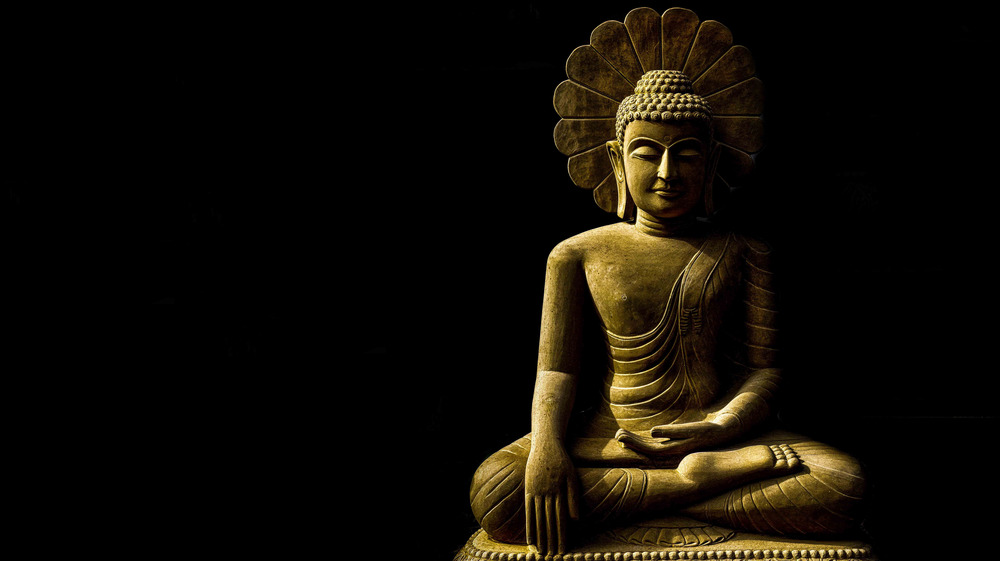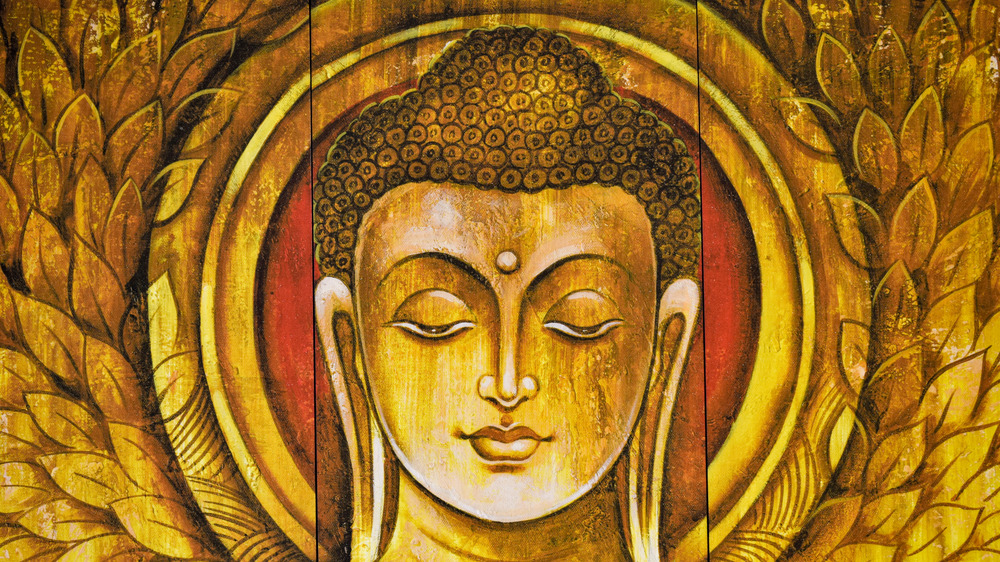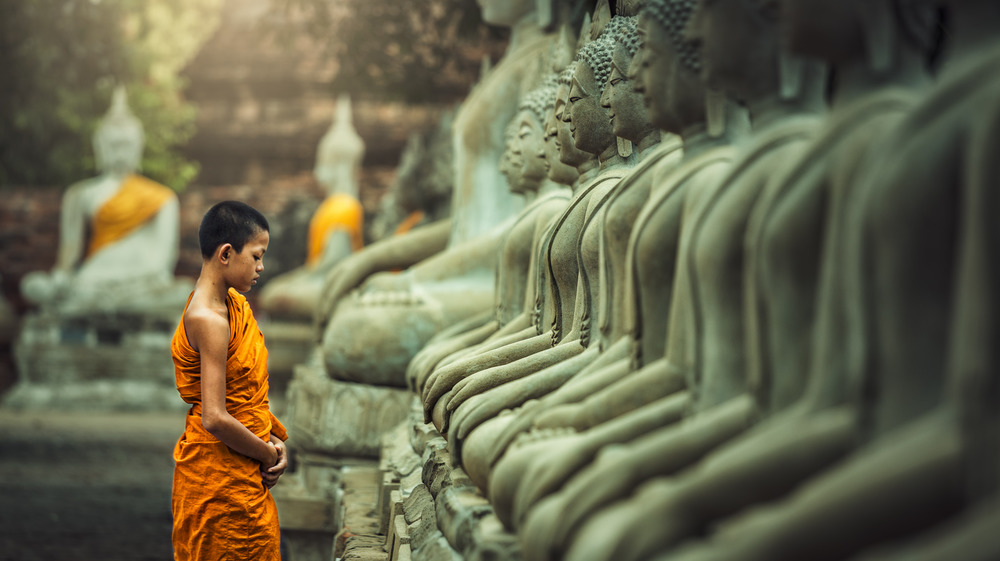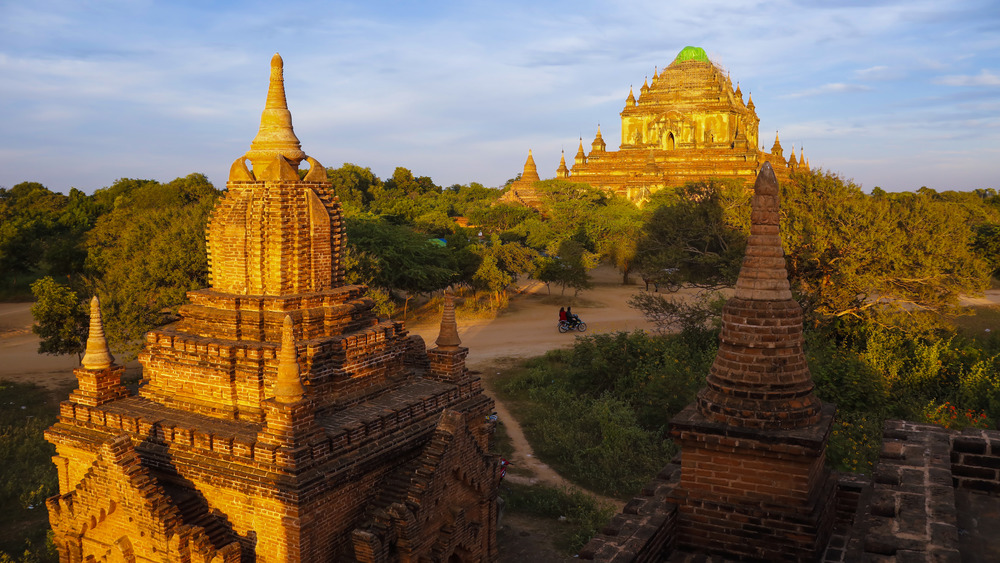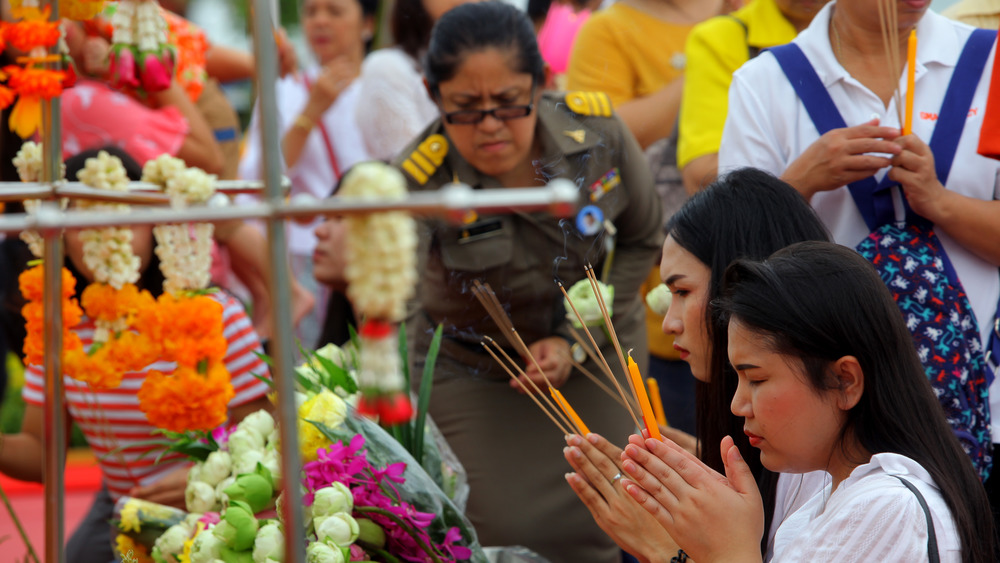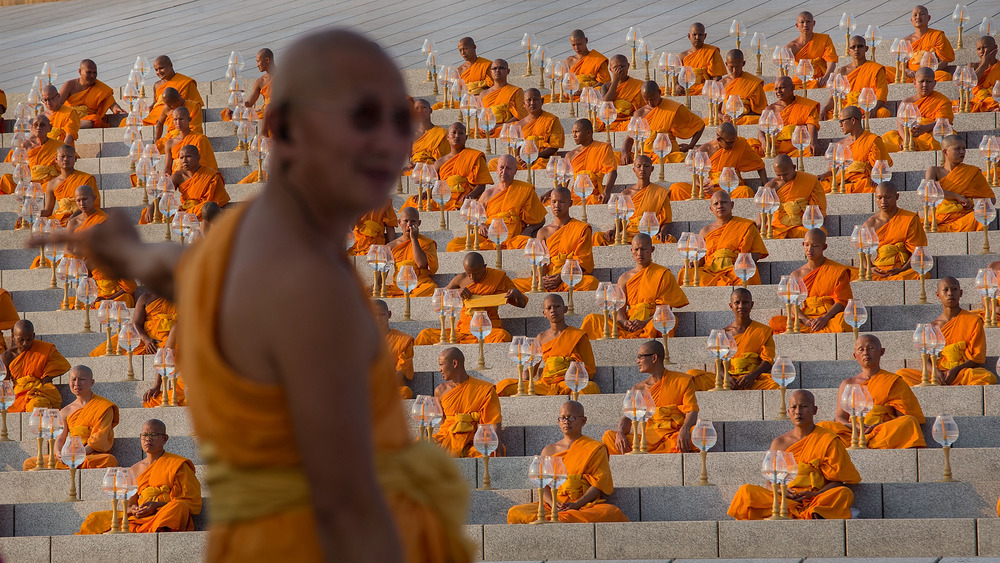The Untold Truth Of Siddhattha Gotama, The Buddha
Buddhism is inarguably one of the world's foremost religions, particularly in East and Southeast Asia, as History relates, with a following of nearly half-a-billion people across countries such as Thailand, Cambodia, China, Sri Lanka, Singapore, Japan, Laos, Taiwan, India, and more. However, it's not really a "religion" as a follower of Abrahamic theologies would imagine. There's no god or gods — which means that the Buddha you might imagine as "that bald guy who has his hands crossed in his lap"? Yeah, he's just a guy. And, he never claimed to be anything other than a man, unlike the key figures of many other religions. This is one of the core tenets of traditional Buddhism, sectarian differences notwithstanding, as the Kahn Academy explains: humanity is its "own master and there is no higher being or power that sits in judgment over his destiny." Buddhism is more of a set of guidelines for a non-extreme, "woke" life that resembles the Buddha's.
Why so many statues of Buddha?
If this is the case, then, you might be wondering: why are there so many giant golden Buddha statues around the world (as seen on Wanderlust) representing gajillions of dollars of institutional wealth? Why do people revere the Buddha so much? What's the difference between respect, reverence, and outright deification? And what's the difference between Buddhism and, say, something like psychology's "self-actualization" at the top of Maslow's hierarchy of needs (where a person realizes their full potential), per Simply Psychology? Isn't Buddhism just secular humanism with a dash of metaphysics?
Those kinds of questions are all totally fair and valid, and deserve to be investigated. They're also questions directed at the modern, codified, processed, millennia-old Buddhism-as-product that we have today, which admittedly, as a faith, has done a fair job of staying focused on that one guy in the past where it all started, the Buddha. The story of a single person with some good advice spawning limitless followers and permutations of beliefs, which themselves become systematized and hegemonic (also see: Jesus + Vatican), is not too uncommon in human history.
Like other beliefs: a man became a myth
However, in this case, the Buddha didn't live so long ago, and so far removed from decent record-keeping, that we don't know anything about him. Some of his tale sounds properly mythologized or obviously romanticized, but we've got some solid, basic facts.
As the BBC tells us, Siddhattha Gautama (sometimes referred to as Siddhattha Gotama or Siddhartha Gautama) lived from 566 to 486 B.C.E. in modern-day Tibet, specifically the village of Lumbini near the foothills of the Himalayas. He was the son of a wealthy family, born into privilege and insulated from the woes of the outside world. It wasn't until he was a young, married man with a son that he left his royal compound for the first time. He was shocked by the poverty, sickness, suffering, and death he saw, and decided to renounce his earthly possessions and wander the world in search of answers to the purpose and meaning of human existence.
Finding a middle way to enlightenment
So that sounds pretty reasonable and universal, right? It's a story of the loss of innocence, and reconciling one's misguided past with the lessons of one's present (i.e., "what I thought was true is not"), and then setting out to better oneself. Sounds like a textbook "inciting incident" for a Hero's Journey script. Or maybe it sounds like what happened to your wealthy, private-school-educated cousin a few years back when he had a personal crisis on his first Eurotrip to the former Eastern Bloc.
But this is where the future Buddha's story starts to sound like a, well... story. This is totally understandable, however, because as The Center for Global Education relates, information about Gautama's life didn't start to surface until the author and poet Ashvaghosa wrote it all down over 500 years later in the 1st or 2nd century C.E.
As it goes, Gautama met an ascetic and yogi who "encouraged him to follow a life of extreme self-denial and discipline." This practice didn't bring Gautama any closer to the truth he sought, though, so he more or less resumed a normal life, but adopted a "middle way" approach. This is around when he went and sat under "the shade of a Bodhi tree" for seven weeks, and boom: he became "the enlightenment one," or "Buddha." He made a public announcement about his revelations in 528 B.C.E., as the Khan Academy explains, gathered a group of disciples, and started traveling around northern India preaching.
The spread of an egalitarian belief system
And yes, if you're thinking, "Hang on, that sounds a lot like that Jesus guy," you're not alone. Ancient Origins highlights a bevy of conspicuous similarities between Jesus and the Buddha, including some of the more supernatural parts of the Buddha's story that have developed over time: a miraculous birth, an evil tempter, a betrayal by a follower, and so on. Was there some cross-pollination? Possibly. There definitely was some cross-pollination between Buddhism and Hinduism, though, seeing as the Buddha essentially got subbed into the Hindu pantheon in place of Balarama, the ninth incarnation of the god Vishnu, as this thread on Quora discusses.
The reason for this swap, though, is connected to the reason why Buddhism flourished in those early days. It implicitly taught the equality of all people on the road to enlightenment, regardless of birth, status, or wealth; this was especially appealing to a region embedded in a rigid caste system. By 260 B.C.E., in fact, Buddhism got state support by the Emperor Ashoka as an officially sponsored belief. (This is also quite similar to how Emperor Constantine adopted Christianity in 313 C.E., also about 300 years after Jesus' initial teachings, per Biography.)
By the time the 9th century rolled around, Buddhism had made its way through the entirety of Asia, changing shape and form as it encountered indigenous cultures. Hence, the rise of the more complex, mystical, ritualistic "Mahayana" Buddhism, and more.
The lasting effects of a single man's life
So who was Siddhartha Gautama, the Buddha? Well, if you're truly Buddhist, you would say: all of us, as we all have the potential to live a sensible life and thereby reduce universal suffering (remember this the next time you think about eating Burger King's Big King XL Burger while a homeless dude shame-watches you). At minimum, and in its most basic form, this is what Buddhism, as a belief system, teaches. Doesn't sound too different from "love your neighbor as yourself" from Matthew 22:37-39 (per Bible Gateway), does it? Keep it simple, folks.
From this core ideal, though, in the centuries since Gautama lived, Buddhism has branched off into countlessly different schools of thought. There's the Confucianism-influenced Shingon sect in Japan that used to engage in self-mummification (per the Japan Times), the mantra-heavy Pure Land sect that believes in self-rebirth in a "pure land" (outlined by the BBC), the mere 50-year-old, often criticized Dhammakaya sect in Thailand, which has one, 1,000-acre temple that conducts brain-shatteringly enormous ceremonies of 1 million-plus people (per HuffPost), and the strictly monastic Siam Nikaya sect in Sri Lanka that, of all things, reintroduced a caste system (per Karava).
And at the center of it all is Siddhartha Gautama, the original Buddha. Whatever else he did with his life, he also preached some pretty radical stuff for his time. And now, 2,500 years later, he'd probably be stunned at how much has been made of him.
